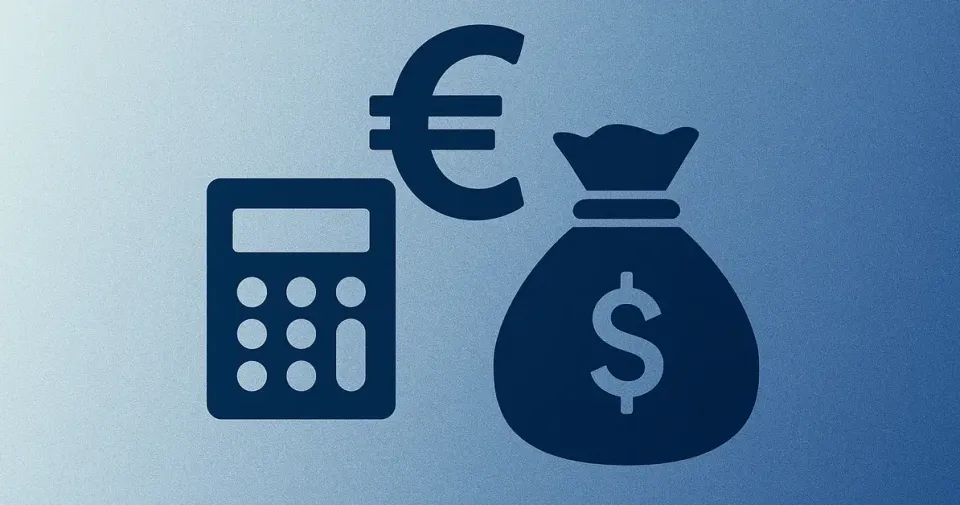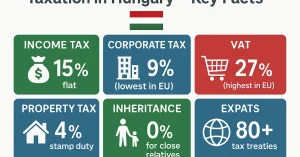Taxation in Hungary

Taxation in Hungary is one of the most competitive systems in Europe. With a 15% flat personal income tax and the lowest corporate rate in the EU at just 9%, Hungary has positioned itself as an attractive hub for investors, entrepreneurs, and expats. This article explores the structure of Hungarian taxes, how they apply to residents and non-residents, and what benefits exist for individuals and companies considering relocation or investment.
Overview of the Hungarian tax system
Taxation in Hungary is simple compared to many EU countries. Residents pay tax on worldwide income, while non-residents are taxed only on Hungarian-sourced income. The system combines flat-rate personal income tax, low corporate taxes, and one of the highest VAT rates in Europe. This unique mix supports both competitiveness and government revenue.
Hungary has more than 80 double taxation treaties, ensuring that income is not taxed twice for foreign investors. The Hungarian Tax Authority (NAV) provides detailed guidance on compliance for individuals and businesses.
Personal income tax in Hungary
One of the main attractions of taxation in Hungary is the flat 15% personal income tax rate. Unlike progressive systems in countries like Germany or France, Hungary applies the same rate to all taxable income categories. This simplicity makes financial planning straightforward for both residents and foreigners.
In addition to income tax, employees and employers contribute to social security. Employees pay 18.5% in social contributions (10% pension, 7% health insurance, 1.5% unemployment). Employers pay an additional 13% “social contribution tax.”
| Taxpayer type | Rate |
| Resident individual | 15% on worldwide income |
| Non-resident individual | 15% on Hungarian-sourced income |
| Employee social security | 18.5% |
| Employer social contribution | 13% |
Non-residents benefit from the same flat rate but can only be taxed on income generated within Hungary, such as salaries, rental income, or dividends. This makes Hungary particularly appealing for digital nomads and cross-border professionals.
Corporate taxation
Corporate taxation in Hungary is one of the most competitive in the EU. Since 2017, the corporate tax rate has been fixed at 9%, the lowest in Europe. This low rate is often supplemented by local business tax (up to 2%), depending on the municipality.
| Tax type | Rate |
| Corporate income tax | 9% |
| Local business tax | 0–2% |
| Innovation contribution | 0.3% |
Small and medium-sized enterprises can benefit from simplified tax regimes, such as the KIVA (small business tax) and KATA (simplified tax for small entrepreneurs), although recent reforms have tightened eligibility.

Hungary also offers R&D incentives, tax credits, and special allowances for investments that create jobs. These features, combined with EU funding, make Hungary a prime destination for setting up companies, particularly in manufacturing and IT.
VAT and indirect taxes
Hungary has the highest standard VAT rate in the European Union, at 27%. Reduced VAT rates apply: 18% for certain food items and internet services, and 5% for medicines, books, and some new housing. Despite the high rate, VAT revenue is crucial for the national budget and ensures stable public financing.
Excise duties also apply to alcohol, fuel, and tobacco. Motor vehicle tax is another significant indirect tax, calculated on engine size and environmental impact.
Property, inheritance, and other taxes
There is no general wealth tax in Hungary, which is attractive for high-net-worth individuals. Property owners, however, pay municipal real estate taxes, varying by location and property size. Stamp duty is due upon property transfers, generally at 4% of the purchase price.
Inheritance and gift taxes are waived for close relatives (spouse, children, parents). For others, rates can reach 18%. This exemption for families makes Hungary appealing for long-term wealth planning.
Vehicle registration tax applies for imported cars, while environmental levies encourage greener mobility.
Taxation for expats and investors
Taxation in Hungary is particularly favorable for expats and foreign investors. With double taxation treaties signed with the United States, Canada, and many EU countries, foreign residents can avoid being taxed twice on the same income. U.S. citizens must still report to the IRS, but treaty benefits and credits often reduce the final tax burden.
Investors benefit from Hungary’s central location in Europe, low taxes, and access to EU markets. Many multinational companies, particularly in automotive and IT sectors, have chosen Hungary for their regional headquarters because of its cost-effective tax regime.
Key benefits for expats and investors:
- 15% flat income tax with simple compliance
- 9% corporate tax, lowest in the EU
- No inheritance tax for close relatives
- Double taxation treaties with 80+ countries
- Special incentives for R&D and startups
Compliance and reporting
All taxpayers must obtain a Hungarian tax identification number. Annual personal income tax returns are filed electronically by May 20 of the following year. Employers withhold taxes monthly for employees, while the self-employed and companies must make advance payments.
Penalties apply for late or incorrect filings, including interest and fines. The Hungarian Tax Authority (NAV) has implemented advanced electronic systems to ensure compliance and transparency.
Expats should also consider international obligations. For example, U.S. citizens are required to file with the IRS and may need to report Hungarian bank accounts under FATCA. Canadians should review rules with the Canada Revenue Agency (CRA) to confirm residency status.
Resources
For more detailed information on taxation in Hungary, consult:
Related content: Moving to Hungary